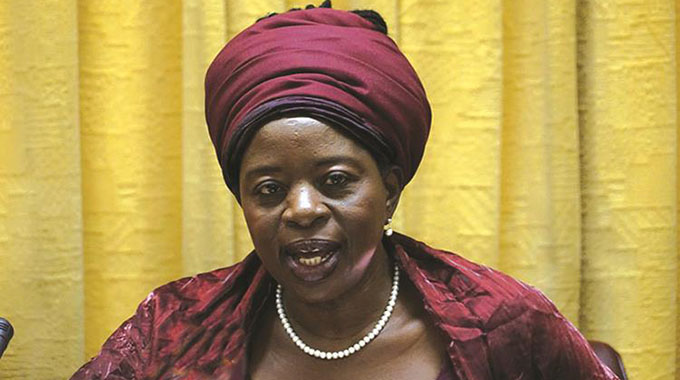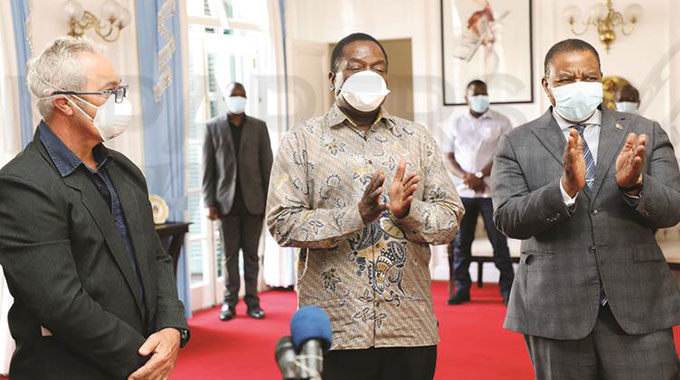Stay at home! . . . as strict new curbs on life begin countrywide

Herald Reporters
AHEAD of the 21-day lockdown starting today to contain the spread of Covid-19, thousands of people yesterday thronged Mbare Musika bus rank in Harare and many other pick-up points seeking transport to various destinations in the rural areas, while others besieged supermarkets and shops in the cities and towns for groceries and other essentials they will need for the lockdown period.
The lockdown, a principal measure announced by President Mnangagwa in his address to the nation on Friday, comes as the number of confirmed Covid-19 has risen to seven and claimed one life.
There were long queues in shops in Harare starting on Saturday as people stocked basics, despite a noticeable increase in prices on most products during the last few days.
It was also a hive of activity at Mbare Musika food market where people were buying fresh farm produce in preparation for the 21 days.
At Mbare Musika bus terminus, thousands of travellers chose to go to their rural areas to spend the lockdown with their relatives.
Bus owners made a killing by hiking fares, much to the disappointment of the travellers.
One traveller Virginia Zimuto said she would rather observe the days in Gokomere, her rural home, than in the city which has a high population concentration.
“I am heading home to Masvingo,” she said. “This is where I will be for the next 21 days. But it is so sad that public transporters have decided to hike their fares.”
At Mbudzi Roundabout illegal pick up point, hundreds of travellers were trying to catch any mode of transport to their various destinations.
“I am going home to Mwenezi with my family,” said one of the travellers. “However, I have been here for the past three hours and not even a bus has passed by. That is why there are a lot of people here.
“What is now worrying is that transporters have hiked fares. We used to pay $110 to go to Masvingo from Harare, but now they are asking for $250 to $300.”
At Showgrounds, hundreds of people were heading to various destinations, but those who spoke to The Herald indicated that they were travelling to their rural homes in the Midlands Province.
Along Second Street and Hebert Chitepo Avenue, a huge crowd was waiting for transport to areas in Mashonaland Central Province.
“We want to spend the 21 days in our rural home in Muzarabani. My family will be back only if we are safe,” said one of the commuters.
Mrs Tendai Nhongo, who was waiting patiently in a long queue to fill her five-kilogramme gas tank at Trek Kambuzuma commended the President for taking measures to prevent the spread of the deadly virus.
The service station was selling gas for $60 per kilogramme.
Mrs Nhongo said she had already stocked enough food to last the 21 days.
“We are taking heed of what the President has advised us to do, that is why you see a long queue here for gas,” she said. “People are making last minute preparations. I just came from Mbare Musika where I bought enough food and other basics which will see my family through the 21 days of the lockdown,” she said.
Some vendors in the city have hiked the price of gas, selling it as high as $200 per kg, while others were selling at US$3 for the same quantity.
Long queues could be seen at most service stations where motorists were refuelling.
Mr Tinei Dumba said he wanted to have enough fuel in case of emergency.
Others thronged money transfer agent, Mukuru’s offices to withdraw their cash.
The lockdown and other measures announced by the President arise from reports and recommendations from an inter-ministerial taskforce on Covid-19 that he has set up.
Spelling out what the lockdown means recently, the President said: “This means all our citizens are required to stay at home, except of course in respect of essential movements related to seeking health services; to purchase and procurement of food and medicines and for the essential supplies and critical services.
“Workers manning our essential services, including health services and outlets, emergency and security services, as well as operation of key utilities like power and water, are exempt from this directive.”
The President said he had directed the National Command Element of the country’s security arms to deploy as appropriate in support of civilian authority.
Only civil servants on duty, in line with decisions and directives of the PSC, heads of ministries and the ad-hoc taskforce on Covid-19, will be exempt from restricted movement.
“While funerals will be exempt from this directive, numbers in attendance should not exceed 50. Visits to hospitals and clinics remain as earlier announced, that is one visitor per patient per day. Motorists seeking to refuel their vehicles will not be allowed to leave their vehicles,” President Mnangagwa said.
In so far as the informal sector was concerned, food markets would be allowed to operate, although under the control of health personnel, while those trading in non-food items would be closed.
The Government will work with local authorities to ensure regular water supplies to residential areas, while the ministries of Information, Publicity and Broadcasting Services and Health and Child Care have been directed to ensure that communities were aware and comprehensively informed about the pandemic.
Medical care facilities are being expanded so that they can carry their normal load and deal with Covid-19-related cases.










Comments